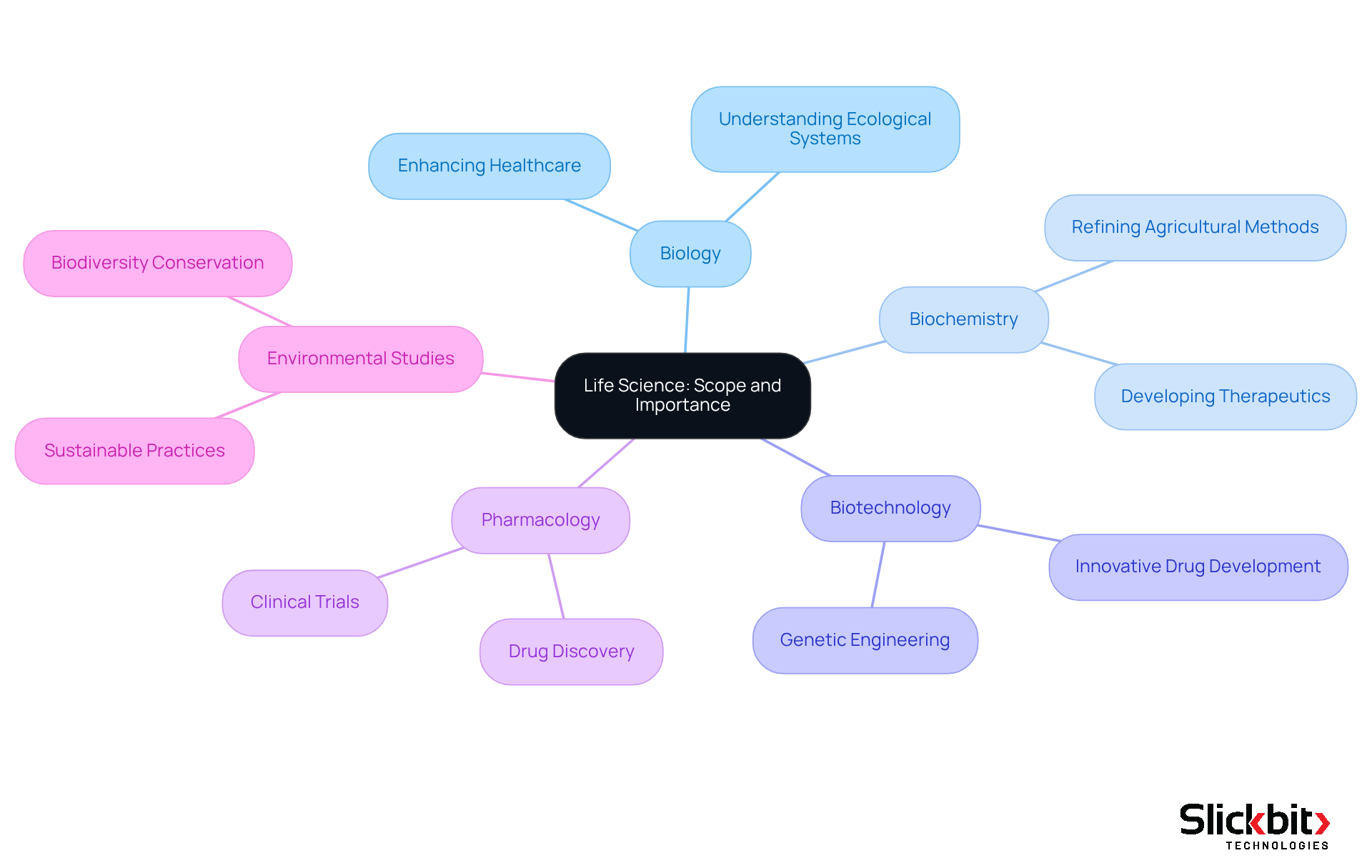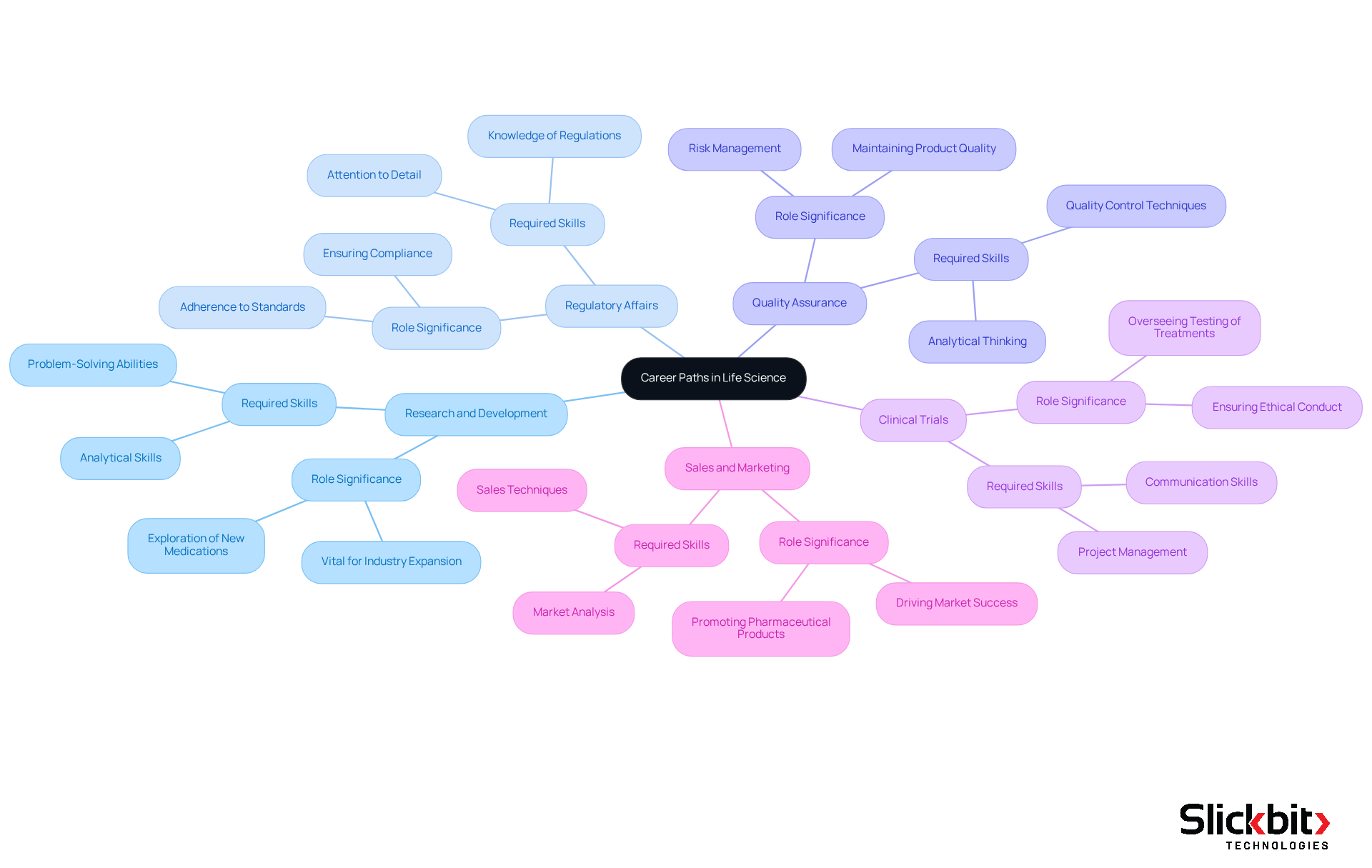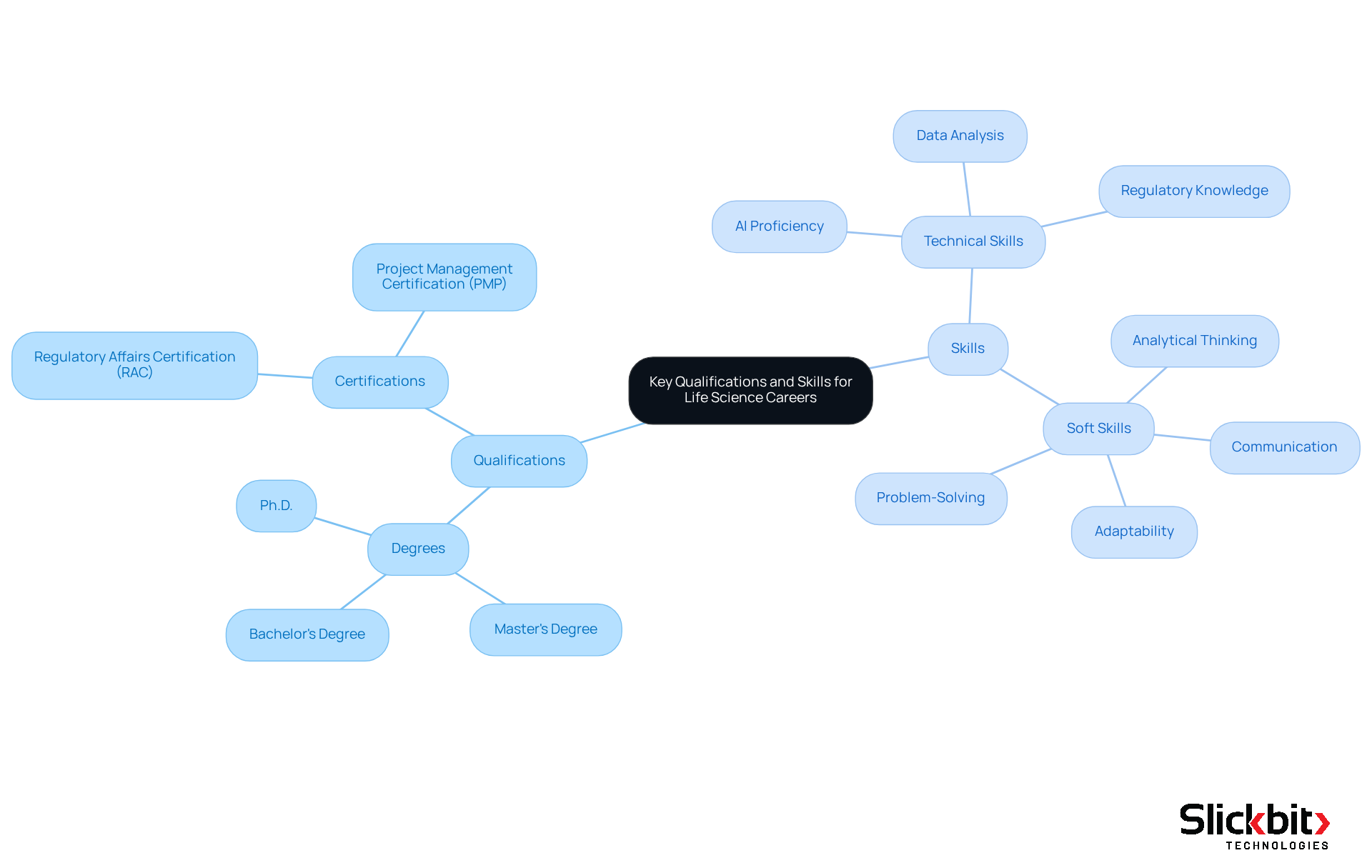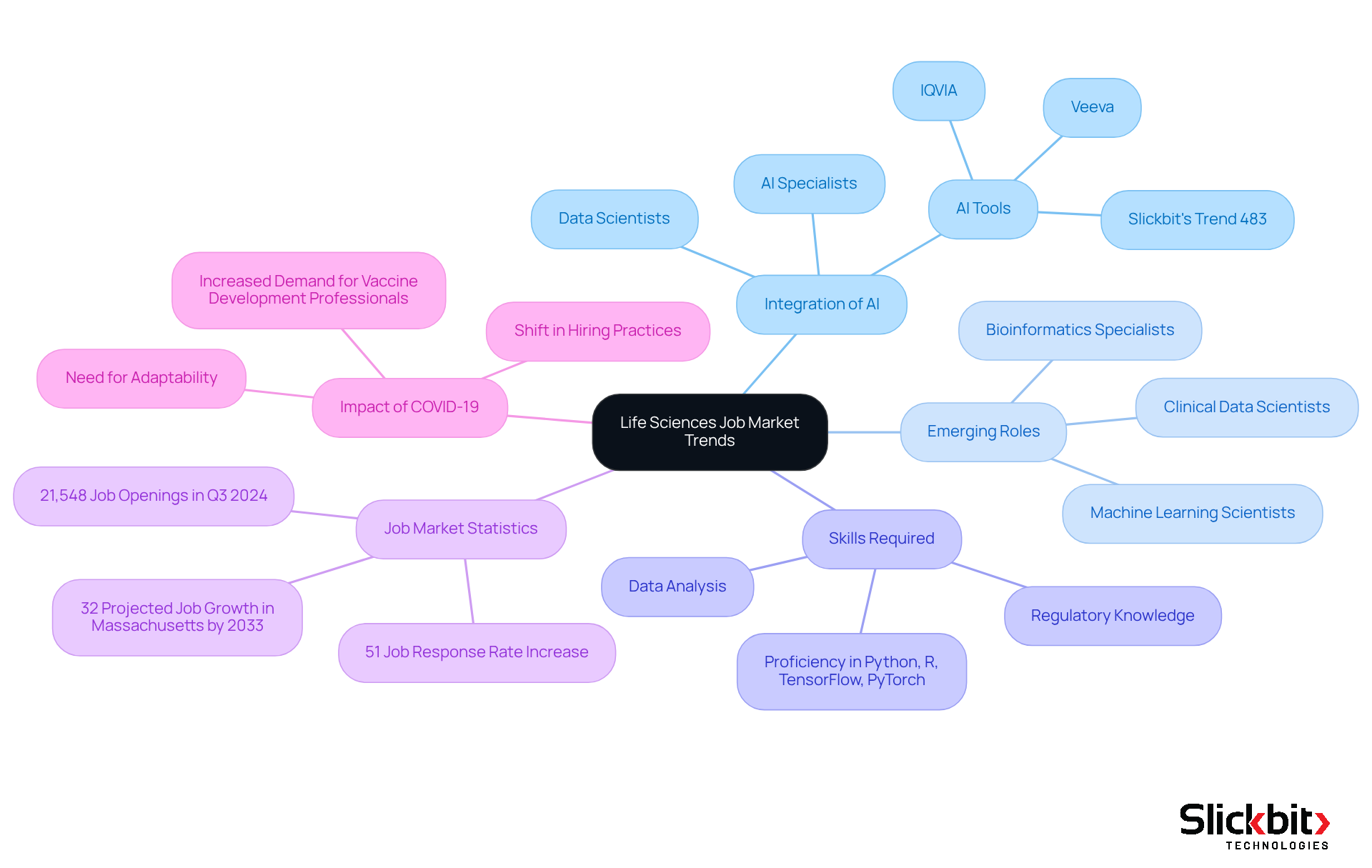Overview
Understanding life science as a career requires an acknowledgment of the diverse paths available, the essential skills needed, and the emerging trends that are shaping the industry. It is crucial to recognize that advanced education, along with proficiency in artificial intelligence and data analysis, stands as a critical qualification for aspiring professionals. Furthermore, the demand for individuals in various roles is on the rise, driven by technological advancements and the pressing need for innovation in healthcare and environmental solutions. Consequently, those looking to enter this field must equip themselves with the necessary knowledge and skills to thrive in a rapidly evolving landscape.
Introduction
The life sciences sector stands at the forefront of innovation, intertwining biology with technology to address some of society's most pressing challenges. As the demand for skilled professionals in this field surges, individuals are presented with a plethora of career paths, each offering unique opportunities to contribute to:
- Healthcare
- Environmental sustainability
- Scientific advancement
However, as industries evolve and new technologies emerge, the question arises: what skills and qualifications will truly set candidates apart in this competitive landscape? This inquiry not only highlights the dynamic nature of the sector but also emphasizes the importance of equipping oneself with the right expertise to thrive.
Define Life Science: Scope and Importance
Life fields encompass a broad range of disciplines dedicated to the study of living organisms and their interactions with the environment. This domain includes critical areas such as:
- Biology
- Biochemistry
- Biotechnology
- Pharmacology
- Environmental studies
The significance of biological studies lies in their vital contributions to:
- Enhancing healthcare
- Refining agricultural methods
- Deepening our understanding of ecological systems
As the global population continues to rise and faces emerging health challenges, the demand for advancements in biological fields intensifies. This establishes life science as a career essential for ongoing research and development.

Explore Career Paths in Life Science
Choosing life science as a career offers a notably diverse landscape, encompassing several key areas such as:
- Research and development (R&D)
- Regulatory affairs
- Quality assurance
- Clinical trials
- Sales and marketing
R&D positions are essential; they emphasize the exploration of new medications and treatments, which is vital considering the industry's anticipated expansion. The U.S. bioeconomy market is projected to reach $3.4 trillion by 2030, underscoring the significance of these roles. Regulatory affairs professionals play a crucial role in ensuring compliance with government regulations—an absolute necessity in an industry where adherence to standards is paramount. Clinical trial managers oversee the testing of new treatments, ensuring that trials are conducted ethically and effectively, while sales representatives are indispensable for promoting pharmaceutical products and driving market success. Each of these positions requires a distinct array of abilities and knowledge, which makes life science as a career an attractive domain for individuals with diverse interests and expertise.
As the industry continues to grow, particularly in innovation hubs such as San Diego and the Bay Area—where the Bay Area contributed $123.6 billion in economic output in 2024—opportunities for career transitions and advancements in life science as a career are abundant. This dynamic character of the sector highlights its essential role in enhancing healthcare. Furthermore, the biological sector in California supports 1.15 million positions and generates $125.7 billion in labor income, emphasizing the substantial job market in this area. The consistent influx of university graduates with biological degrees is crucial for renewing and improving the current workforce, particularly in life science as a career, as noted by CBRE Research.
Moreover, parallels can be drawn with the restaurant sector's adoption of AI solutions for operational efficiency. Professionals in the biological field can leverage similar technologies to enhance research processes, improve regulatory compliance, and optimize clinical trials. For instance, AI can assist R&D teams in drug discovery by analyzing vast datasets more efficiently, while regulatory affairs specialists can utilize AI tools to ensure compliance with evolving regulations. This integration of AI not only creates new career opportunities but also drives innovation within the sector.

Identify Key Qualifications and Skills for Life Science Careers
In the competitive landscape of life science as a career, essential qualifications typically include a degree in relevant fields such as biology, chemistry, or pharmacology. Advanced degrees, particularly Master's or Ph.D., are increasingly preferred for research-oriented positions, reflecting the industry's demand for specialized knowledge. Approximately 10% of biological job postings require a Master's degree or higher, underscoring the importance of advanced education in securing desirable roles.
Fundamental skills for biological professionals encompass:
- Analytical thinking
- Problem-solving
- Meticulous attention to detail
As the industry embraces AI and data-driven methodologies, proficiency in data analysis and a robust understanding of regulatory requirements have become indispensable. Notably, the demand for AI capabilities in biological sectors is reported to be twice the UK average, with 2% of biological job listings referencing AI skills, exceeding the national average of 1%. This trend emphasizes the necessity for professionals adept at navigating complex datasets and regulatory frameworks.
Moreover, strong communication skills are essential, as collaboration with cross-functional teams and the effective presentation of findings to stakeholders are integral to success. The ability to articulate complex scientific concepts clearly can significantly enhance a professional's impact within their organization. Additionally, certifications such as Regulatory Affairs Certification (RAC) can provide a substantial advantage in the competitive job market.
As the biological sectors continue to evolve, individuals equipped with advanced degrees and a diverse skill set will be well-positioned to excel in life science as a career within this dynamic field. Furthermore, with the UK projected to require approximately 133,000 more health sector professionals by 2030, the demand for qualified individuals in this area is evident. Internships with CROs, laboratories, or biotech startups offer crucial exposure to real-world challenges, enriching the practical aspect of the qualifications discussed. Given the competitive nature of the job market, where competition for roles has intensified, candidates must also cultivate soft skills such as adaptability and communication, alongside their technical expertise.

Understand Trends and Challenges in the Life Sciences Job Market
The life science as a career sector is currently experiencing a significant transformation, driven by the increasing integration of technology, particularly artificial intelligence (AI), into research and development processes. This shift is generating new positions centered on data analytics and AI implementation while also transforming existing roles. For instance, positions such as data scientists and AI specialists are becoming essential as organizations seek to leverage AI for enhanced decision-making and operational efficiency. Tools like Slickbit's Trend 483 exemplify this trend by utilizing AI to identify systemic risks and compliance issues from FDA inspections, enabling organizations to search, filter, and view full 483s for deeper insights that can inform strategic decisions.
Statistics indicate that the job response rate in the biotech sector has risen by 51%, reflecting heightened competition among job seekers. As of early 2025, the demand for professionals skilled in AI and data analysis is particularly pronounced, with employers prioritizing candidates who can navigate complex datasets and regulatory frameworks. Proficiency with platforms like Veeva and IQVIA is now a baseline expectation for candidates in R&D, regulatory, and medical affairs, as these tools are integral to managing compliance and operational efficiency.
Moreover, the COVID-19 pandemic has accelerated the need for skilled professionals in vaccine development and public health, underscoring the importance of adaptability in this dynamic job market. As companies increasingly adopt advanced technologies, including AI-driven tools for compliance and operational efficiency, the ability to integrate these innovations into everyday practices will be crucial for career advancement. Experts stress that individuals who can connect traditional roles in biological fields with new technological requirements will stand out in the competitive hiring environment. Additionally, with projected job growth of 32% in Massachusetts by 2033, the outlook for life science as a career remains positive, despite the challenges posed by evolving regulations and market dynamics.

Conclusion
A career in life sciences presents a vital and expansive opportunity for individuals who are passionate about understanding living organisms and their interactions with the environment. This field plays a crucial role in advancing healthcare and agriculture while also addressing pressing ecological challenges. As global demand for innovations in these areas continues to grow, pursuing a career in life sciences becomes increasingly significant for personal fulfillment and societal advancement.
The article underscores various career paths within life sciences, including:
- Research and development
- Regulatory affairs
- Clinical trials
Each requires a unique set of skills and qualifications. The integration of technology, particularly artificial intelligence, is reshaping the landscape of these roles, creating new opportunities and necessitating a blend of traditional biological knowledge with modern technological proficiency. Moreover, the emphasis on advanced degrees and essential competencies such as analytical thinking and effective communication further underscores the competitive nature of this field.
Reflecting on trends and challenges in the life sciences job market reveals a sector in flux, ripe with potential for those willing to adapt and grow. As the industry evolves, aspiring professionals are encouraged to embrace continuous learning and explore innovative solutions to remain relevant. The future of careers in life sciences is promising, with abundant opportunities for those prepared to meet the demands of this dynamic environment, ultimately contributing to the betterment of healthcare and society as a whole.
Frequently Asked Questions
What is life science?
Life science encompasses a broad range of disciplines dedicated to the study of living organisms and their interactions with the environment.
What are some key fields within life science?
Key fields within life science include Biology, Biochemistry, Biotechnology, Pharmacology, and Environmental studies.
Why are biological studies significant?
Biological studies are significant because they contribute to enhancing healthcare, refining agricultural methods, and deepening our understanding of ecological systems.
How does the global population impact the field of life science?
As the global population continues to rise and faces emerging health challenges, the demand for advancements in biological fields intensifies, making life science a critical career for ongoing research and development.




